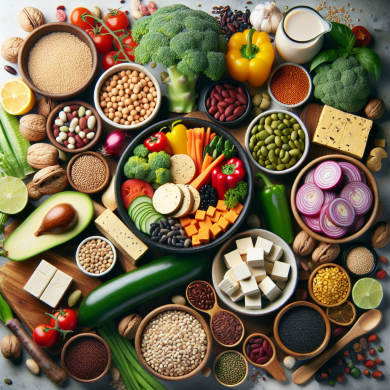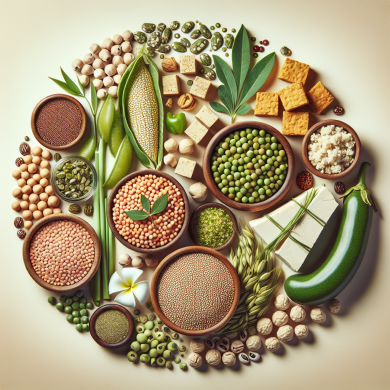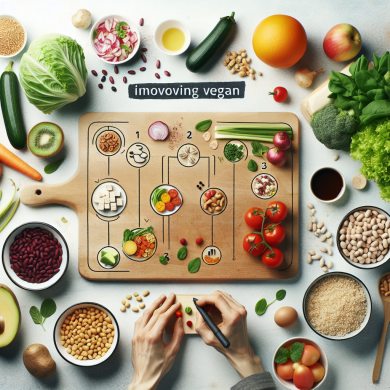Vegan Weight Loss: Effective Tips for Success
Embarking on a weight loss journey as a vegan can be both rewarding and challenging. While a plant-based diet is often associated with numerous health benefits, including weight loss, it requires careful planning to ensure nutritional adequacy and effectiveness. This article provides comprehensive tips to help vegans achieve their weight loss goals successfully.
Understanding Veganism and Weight Loss
A vegan diet excludes all animal products, focusing instead on fruits, vegetables, grains, nuts, and seeds. This approach can naturally lead to lower calorie intake, as plant-based foods are generally less calorie-dense than animal products. However, weight loss isn’t guaranteed simply by switching to a vegan diet. It’s essential to make informed food choices and adopt healthy habits.
The Basics of a Balanced Vegan Diet
Prioritize Whole Foods
Whole foods are minimally processed and retain their natural nutrients. Prioritizing these foods helps ensure you get the necessary vitamins, minerals, and fiber. Focus on whole grains, legumes, fresh fruits, and vegetables. These foods are not only nutrient-dense but also keep you feeling full longer, reducing the temptation to snack on less healthy options.
Keep an Eye on Protein Intake
Protein is crucial for weight loss as it helps maintain muscle mass and boosts metabolism. Vegans can obtain protein from sources like lentils, chickpeas, quinoa, tofu, tempeh, and seitan. Incorporate a variety of these protein sources into your diet to ensure you’re getting all essential amino acids.
Watch Your Portions
Even healthy foods can contribute to weight gain if consumed in large quantities. Pay attention to portion sizes, especially with high-calorie plant-based foods like nuts, seeds, and avocados. Use smaller plates and bowls, and listen to your body’s hunger cues to avoid overeating.
Effective Vegan Weight Loss Strategies
Incorporate Regular Exercise
Exercise is a vital component of any weight loss plan. Aim for a mix of cardiovascular activities (like running, cycling, or swimming) and strength training exercises. Building muscle can enhance your metabolism, helping you burn more calories even at rest. Yoga and pilates can also be beneficial for improving flexibility and reducing stress.
Stay Hydrated
Water plays a significant role in metabolism and appetite regulation. Sometimes, our bodies mistake thirst for hunger, leading to unnecessary calorie consumption. Aim to drink at least 8-10 glasses of water daily. Herbal teas and infused water can be excellent alternatives if you find plain water unappealing.
Plan Your Meals
Meal planning can prevent impulsive eating and ensure a balanced diet. Set aside time each week to plan and prep your meals. Consider batch cooking staples like grains and legumes, and prepare fresh vegetables and fruits for easy access. This approach saves time and helps you stick to your nutritional goals.
Mindful Eating
Mindful eating involves paying full attention to the experience of eating and drinking, both inside and outside the body. Practice eating slowly, savoring each bite, and recognizing when you’re full. This mindfulness can reduce overeating and improve your relationship with food.
Overcoming Challenges in Vegan Weight Loss
Avoiding Processed Vegan Foods
The vegan market is flooded with processed foods like mock meats, vegan cheeses, and snacks. While these can be convenient, they often contain unhealthy fats, sugars, and additives. Limit consumption of these foods and focus on whole, natural ingredients.
Ensuring Nutritional Adequacy
Vegans need to pay extra attention to certain nutrients like vitamin B12, iron, calcium, omega-3 fatty acids, and vitamin D. Consider fortified foods or supplements to meet your daily requirements. Regular blood tests can help monitor your nutrient levels and prevent deficiencies.
Dealing with Social Situations
Social events can be challenging due to limited vegan options. Plan ahead by eating a small meal beforehand or bringing a vegan dish to share. Communicate your dietary needs to friends and family to ensure they understand and can accommodate your lifestyle.
Tracking Progress and Staying Motivated
Set Realistic Goals
Setting achievable goals is crucial for maintaining motivation. Focus on small, attainable milestones rather than drastic changes. Celebrate each success, no matter how minor, to keep your spirits high and motivation strong.
Use Technology Wisely
Apps and online tools can help track your food intake, exercise, and progress. They provide valuable insights into your habits and can help identify areas for improvement. However, avoid becoming overly reliant on them; listen to your body and adjust your approach as needed.
Seek Support
Join vegan and weight loss communities online or in-person for encouragement and advice. Sharing experiences and challenges with others can provide motivation and accountability. Consider working with a dietitian specializing in vegan nutrition for personalized guidance.
Conclusion
Vegan weight loss is attainable with the right strategies and mindset. Prioritizing whole foods, maintaining a balanced diet, and incorporating regular exercise are essential components. By planning meals, practicing mindful eating, and overcoming challenges, vegans can achieve their weight loss goals while ensuring nutritional adequacy. Stay motivated by setting realistic goals, using technology wisely, and seeking support. Remember, weight loss is a journey, not a destination, and the key to success is consistency and perseverance.















Add comment